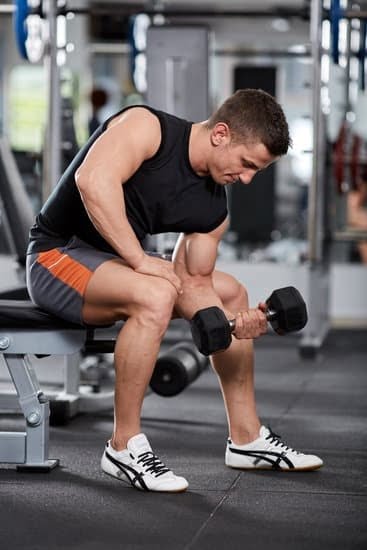How to keep fit without exercise is a common concern for many individuals who may not have the time or desire to engage in traditional workouts. In this article, we will explore various strategies and lifestyle adjustments that can help maintain physical fitness without the need for structured exercise routines.
While regular physical activity offers numerous health benefits, there are alternative approaches to staying fit that can be just as effective. By making small changes to daily habits and prioritizing overall wellbeing, it is possible to achieve and sustain a healthy lifestyle.
One of the key components of maintaining fitness without exercise is through the adoption of a nutritious diet. By focusing on consuming wholesome, balanced meals and controlling portion sizes, individuals can support their overall health and manage their weight without relying solely on rigorous workouts.
Additionally, incorporating physical activity into daily routines can also contribute to maintaining fitness levels. Simple yet effective movements such as taking the stairs instead of the elevator or going for short walks throughout the day can make a significant impact on overall fitness.
In addition to dietary choices and physical activity, managing stress and ensuring mental wellbeing are essential aspects of staying fit without exercise. The connection between mental health and physical wellness is profound, and by implementing stress-reducing techniques and prioritizing quality sleep, individuals can improve their overall wellbeing.
hydrating effectively also plays an important role in achieving and maintaining optimal fitness levels without engaging in formal exercise routines. By addressing these areas holistically, individuals can work toward a fit and healthy lifestyle that goes beyond conventional workout methods.
How to Maintain a Healthy Diet
Maintaining a healthy diet is essential for keeping fit without relying solely on exercise. It not only helps in managing weight but also provides the necessary nutrients for overall wellbeing. One of the key tips for eating nutritious meals is to ensure that your plate is balanced with a variety of food groups including fruits, vegetables, whole grains, lean proteins, and healthy fats. Controlling portion sizes is equally important as it can prevent overeating and promote better digestion.
In addition to choosing the right foods, it’s also essential to pay attention to the way meals are prepared. Opting for cooking methods such as grilling, steaming, and baking rather than frying can help reduce the intake of unhealthy fats and calories. Furthermore, incorporating more fiber-rich foods into your diet can aid in digestion and promote a feeling of fullness, reducing the likelihood of overeating.
According to studies by the American Heart Association, maintaining a healthy diet has been linked to reduced risk of chronic diseases such as heart disease and diabetes. This underscores the importance of making mindful food choices and controlling portion sizes when striving to keep fit without regular exercise.
| Healthy Diet Tips | Benefits |
|---|---|
| Balance your plate with various food groups | Provides necessary nutrients for overall wellbeing |
| Control portion sizes | Prevents overeating and promotes better digestion |
| Incorporate more fiber-rich foods | Aids in digestion and promotes feeling of fullness |
Incorporating Physical Activity in Daily Routine
Maintaining physical fitness without traditional exercise can be achieved by incorporating small bursts of movement throughout the day. These simple activities can have a significant impact on overall health and fitness. Here are some suggestions for including physical activity in your daily routine:
- Take the stairs instead of the elevator whenever possible. Climbing stairs is a great way to get your heart rate up and strengthen your leg muscles.
- Set a timer to remind yourself to stand up and stretch every hour, especially if you have a sedentary job. Stretching can improve flexibility and reduce muscle tension.
- Park further away from your destination to add extra steps to your day. Walking just a few minutes more each day can contribute to improved cardiovascular health.
- Use commercial breaks during TV time as an opportunity to do quick exercises like squats, lunges, or jumping jacks. This can help break up long periods of sitting and increase calorie burn.
By incorporating these small bursts of movement into your daily routine, you can make progress towards maintaining physical fitness without relying on structured exercise sessions. The key is to find ways to stay active throughout the day, even if it’s just a few minutes at a time.
Stress Management and Mental Wellbeing
In today’s fast-paced world, managing stress and prioritizing mental wellbeing are essential components of overall fitness. Chronic stress can have a detrimental impact on physical health, leading to conditions such as high blood pressure, heart disease, obesity, and a weakened immune system. Therefore, finding effective techniques to reduce stress and improve mental health is crucial for maintaining a fit and healthy lifestyle without solely relying on traditional exercise routines.
One effective technique for managing stress is mindfulness meditation. This practice involves focusing on the present moment without judgment, which can help reduce anxiety and improve overall mental wellbeing. Research has shown that regular mindfulness meditation can lower stress levels, enhance emotional regulation, and even improve cognitive function.
Another important aspect of stress management is establishing boundaries and learning to say no when necessary. Many individuals experience stress because they take on too many responsibilities or feel obligated to accommodate others at the expense of their own wellbeing. Learning to set boundaries and prioritize self-care can significantly reduce stress levels and contribute to better mental health.
Additionally, engaging in activities that bring joy and relaxation, such as spending time with loved ones, pursuing hobbies, or enjoying nature, can also help alleviate stress. It’s important to carve out time for activities that promote happiness and relaxation as part of an overall strategy for reducing stress and improving mental wellbeing.
| Stress Management Technique | Impact |
|---|---|
| Mindfulness meditation | Lower stress levels, enhance emotional regulation, improve cognitive function |
| Establishing boundaries | Reduction in stress levels by prioritizing self-care |
| Pursuing hobbies or enjoyable activities | Promotion of happiness and relaxation to alleviate stress |
Importance of Quality Sleep
Sleep is an essential component of overall health and wellbeing, and its impact on physical fitness should not be overlooked. Quality sleep plays a crucial role in supporting the body’s ability to recover, repair, and perform optimally. Poor sleep can lead to decreased energy levels, reduced cognitive function, and even weight gain. Here are some tips for improving sleep quality:
- Establish a consistent sleep schedule: Going to bed and waking up at the same time every day helps regulate your body’s internal clock.
- Create a relaxing bedtime routine: Engage in calming activities such as reading, taking a warm bath, or practicing relaxation techniques to signal to your body that it’s time to wind down.
- Avoid stimulating activities before bed: Limit screen time, avoid heavy meals, and refrain from consuming caffeine or alcohol close to bedtime.
In addition to these tips for improving sleep quality, it’s important to recognize the link between sleep and physical fitness. Without adequate sleep, the body may struggle with muscle recovery and performance during physical activity. Furthermore, insufficient sleep can lead to an increased risk of injuries during exercise. By prioritizing quality sleep, individuals can enhance their overall physical fitness and improve their ability to engage in other forms of non-exercise related activities for maintaining health.
Hydration and Its Impact on Fitness
The Importance of Staying Hydrated
Staying hydrated is crucial for overall health and plays a significant role in maintaining fitness. Water is essential for various bodily functions, including regulating body temperature, lubricating joints, and aiding in digestion. Dehydration can lead to decreased energy levels, muscle fatigue, and even impair cognitive function. When it comes to staying fit without traditional exercise, adequate hydration is key to supporting the body’s natural processes and optimizing physical performance.
How Hydration Affects Physical Fitness
When the body is dehydrated, it can impact physical performance during daily activities as well as impacting overall fitness levels. Even mild dehydration can cause a decrease in endurance and strength, making it more challenging to stay active throughout the day.
Proper hydration ensures that muscles are able to work efficiently and recover effectively after physical activity. Additionally, staying hydrated can help reduce the risk of muscle cramps and support cardiovascular health, which are essential aspects of maintaining overall fitness levels.
Tips for Maintaining Hydration
To support overall fitness without traditional exercise, it’s important to focus on maintaining proper hydration throughout the day. This includes drinking an adequate amount of water based on individual needs, which can vary depending on factors such as activity level and climate. Consuming hydrating foods such as fruits and vegetables can also contribute to overall fluid intake.
Establishing a routine of regular water consumption, especially before, during, and after any physical activity throughout the day, is essential for supporting fitness without relying solely on structured exercise routines. It’s important to be mindful of signs of dehydration and make adjustments to fluid intake as needed to ensure optimal hydration for both physical health and fitness goals.
Managing Habits and Behaviors
Identifying Unhealthy Habits
The first step in managing habits and behaviors to maintain overall fitness without traditional exercise is to identify unhealthy habits. This can include habits such as smoking, excessive alcohol consumption, poor eating habits, and sedentary behavior. Recognizing these behaviors is the initial step towards making positive changes for a healthier lifestyle.
Setting Realistic Goals and Making Small Changes
One effective strategy for breaking unhealthy habits and developing healthy lifestyle behaviors is to set realistic goals and make small changes gradually. It can be overwhelming to try to completely overhaul one’s lifestyle all at once. By setting achievable goals and making small changes over time, individuals are more likely to sustain these changes in the long run.
Seeking Support and Accountability
Seeking support from friends, family, or even professional guidance can be crucial in managing habits and behaviors for maintaining fitness without traditional exercise. Having a support system can provide encouragement, motivation, and accountability. Whether it’s joining a support group, working with a health coach, or simply sharing progress with loved ones, having support can make a significant difference in successfully breaking unhealthy habits and developing healthy behaviors.
Conclusion
In conclusion, it is possible to maintain a fit and healthy lifestyle without relying solely on traditional exercise routines. By incorporating healthy eating habits, small bursts of physical activity, stress management techniques, quality sleep, hydration, and developing healthy lifestyle behaviors, individuals can achieve overall wellness. These small steps can have a significant impact on physical fitness and mental wellbeing.
It is important to remember that maintaining a healthy lifestyle is not about perfection, but rather consistency. Taking small steps each day towards healthier choices can lead to long-term benefits. It’s about making sustainable changes that fit into our daily lives rather than drastic measures that are difficult to maintain.
Ultimately, by focusing on nutrition, movement throughout the day, managing stress and mental wellbeing, prioritizing quality sleep, staying hydrated, and developing healthy habits and behaviors, individuals can achieve fitness without necessarily engaging in formal exercise. It’s about finding balance and making choices that support overall health and wellness. So let’s take these small steps towards a fit and healthy lifestyle and enjoy the long-term benefits of improved wellbeing.
Frequently Asked Questions
Is It Possible to Stay Fit Without Exercise?
It is possible to maintain a certain level of fitness without traditional exercise. Activities such as walking, taking the stairs, and engaging in household chores can all contribute to staying fit. Additionally, focusing on maintaining a healthy diet and staying active throughout the day can also help in staying fit without formal exercise.
How Do You Stay Fit if You Can’t Exercise Easily?
If exercising is difficult, there are still ways to stay fit. It’s important to focus on nutrition and maintain a balanced diet.
In addition, incorporating small changes into daily activities such as stretching or standing instead of sitting can also make a difference. Finding low-impact activities like swimming or yoga may also be helpful in staying active while minimizing strain on the body.
How Can I Shape My Body Without Exercise?
Shaping one’s body without formal exercise is possible through dietary choices and lifestyle changes. Watching portion sizes, choosing nutrient-dense foods, and staying hydrated can all support overall health and body shape.
Additionally, paying attention to posture and making simple adjustments to daily movements (like walking more) can help in shaping the body without relying solely on traditional exercise methods.

Passionate about providing useful information to anyone with an interest in the field of Personal Training, I strive to pass on to our readers quality information and to answer any questions about Personal Trainers, the work they do and how to become one.





